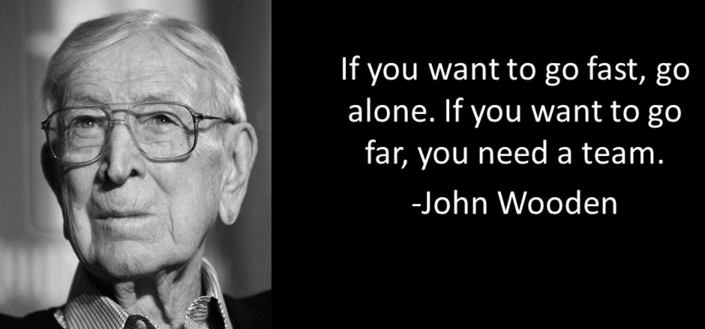I spent 38 + years in my career in management and leadership of employees very interested in a successful corporate career. This included coaching, mentoring, and assisting in employee development plans for a successful career. My ultimate goal was to build employees with legendary leadership styles and influence skills.
Ones that could easily move pass me in the leadership chain. And that happened on occasions over those years.

I am always doing that which I cannot do, in order that I may learn how to do it.
– Pablo Picasso
Let me tell you about the secret habits that I focused on.
Before we continue, let me ask you a question.
What works best for your leadership in your business? We would love to hear what it was. Would you do us a favor and post it in the comments section below? Be the one who starts a conversation.
With the advent of the Internet, the number of marketing options available to both budding and experienced entrepreneurs has become staggering.
The brain is the strongest muscle in the body. You’ve heard stories of how combat soldiers have been shot repeatedly but were not aware of it until the fight was over. These stories are true, and the power to do such things comes from the mind and can be tapped into by practicing mental preparation.
When it comes to improving career success, here are my 18 ways to build the best opportunities for success in a corporate career.
Are you aware of the impact of awesome habits for success and positive thinking on your personal development? But how to best build these habits and this positive attitude is another matter, isn’t it?
Maintain a positive attitude
Learn what attitude is, what aspects of your life are controlled or directed by your attitude, and how to determine your attitude at any given moment. Know what specific strategies make a positive attitude a permanent habit in your life.
You will perhaps have heard this very old story illustrating the difference between positive and negative thinking:
Many years ago two salesmen were sent by a British shoe manufacturer to Africa to investigate and report back on market potential.
The first salesman reported back, “There is no potential here – nobody wears shoes.”
The second salesman reported back, “There is massive potential here – nobody wears shoes.”
This simple short story provides one of the best examples of how a single situation may be viewed in two quite different ways – negatively or positively. And it is not difficult to see which one you want, eh?

Be loyal
Team loyalty in the corporate environment seems to be a dying philosophy. Loyalty to the team starts at the top.
If it’s lacking at the senior executive level, how can anyone else in the organization embrace it?
Loyalty is about leading by example, providing your team with unconditional support, and never throwing a team member under the bus.
Leadership … have a vision
Invest time to imagine what the future is going to look like and how you’ll need to adapt to fit into it. Remember though, vision without action is a daydream.
No matter how big your plans and dreams, they’ll never become reality until you act on them.
Use initiative
Always be on the lookout for actions that have been overlooked and show initiative to get them done.
Put others before yourself
Get up every day and ask yourself what you will do to add value to your team, such as simply offering your assistance with a project.
The challenge is overcoming the fear that your team member might say: “Yes, I really need your help with this project…tonight.”
Assume you don’t know enough
Because you don’t. Any effective team member understands that training is never complete. It’s true in the SEAL teams, and it’s true for any elite team.
Those who assume they know everything should be eliminated. Those who spend time inside and outside of the workplace developing their knowledge and skills will provide the momentum for their team’s forward progress.
Be persistent
Develop the focus and determination required to succeed. Create an attitude of gratitude as the access to fulfilling your dreams.
Those are eighteen career success principles I tried to follow in my career development and use with my employees. Not all apply in every situation, but if followed, they will not lead you astray.
Be detail-oriented
Attention to detail is one of our company’s values. Do we get it right all the time? Of course not. Imagine, though, if all members of a team are obsessed with detail in their delivery?
Don’t ask yourself what you are going to do today to be successful; ask how you are going to do it.
Try one new thing at least weekly
Your life will be in constant change mode, and that is a good thing if you lead change in direction of your success goals. To do that most successfully, you should try lots of new things continually.
For things you like, get very good at them with lots of practice. But keep trying new activities.
Never get comfortable
Always push yourself outside of your comfort zone. If you do this continually with every task you take on, that boundary will continue to widen.
This process will ensure that you are continually maximizing your potential, which will positively impact your team.

Strong relationships
Build beneficial relationships with many people.
Networking and making friends is the name of the game.
Focus on results
Deliver objectively unmistakable value that transcends opinion.
This should be your number one priority.
Continuous learning
Know what your skills are and what they are not. Keep adding to it all the time – with both your own development and surrounding yourself with others who complement your talents.
Remember to focus on your strengths and set your weaknesses aside.
Maintain patience
The proper timing of your words and acts will give you a big advantage over people who are impatient.
For example: Don’t click send on the email right away — breathe and reread it. The classic example would be getting irate and sending something with hostility.
Much of real happiness is a matter of being aware of what you’re doing while you’re doing it — and enraged people aren’t typically conscious of their actions.
Know lessons learned
Become recognized as a corporate historian, remembering what’s been done, what’s worked and hasn’t and why, where ALL the bodies are buried.
Who was responsible for putting the bodies where they were buried. Avoid relearning old mistakes.
Keep an open mind
Those who close themselves off from certain ideas and associate only with like-minded people are missing out on not only personal growth but also opportunities for advancing their careers.
Develop lots of self-confidence
Understand the nature of human potential through a simple process of identifying your personal talents and abilities.
Remember to develop strengths and personal interests to create fulfillment and economic opportunities for your future.
Put creative imagination to work
Extend your physical ability to accelerate creative problem solving and goal achievement in all areas of your life.
Smile often
The greatest asset a person can show is a ‘million-dollar smile’. This allows people to lower their guards during conversations with you.
Listen much more than you talk
The most likable people know that it’s not worth offending people by expressing everything they know, even if they are true. Pay close attention to someone speaking to you and show interest.
Using a conversation as an opportunity to lecture someone may feed the ego, but it never attracts people or makes friends.
Don’t procrastinate
Procrastination communicates to people that you’re hesitant to take action. This demonstrates the worst form of fear.
Always keep your cool
Maintain your composure in all circumstances. Overreaction to things either positive or negative can give people a poor impression.
Always remember that silence may be much more effective than angry words.
Express interest in people
The most likable people use conversations as an opportunity to learn about another person and give them time to share a story.
Show you care
Successful people don’t pretend to be likable; they are likable because they show care for others.
Having a confidant who can be completely honest with you allows continued growth.
Reflect at end of every day
Most of the time, heading out of the office is the time for rehearsing everything that went wrong that day.
We recommend also reflecting on what went well. That way you’re not denying that some things went poorly, but you’re getting a richer picture of what happened.
Remember to work on all these habits … it is another great way to show people a positive mental attitude.

Could this checklist help you start your day?
Do you have suggestions to add to the list?
Be sure and walk the talk on these!
